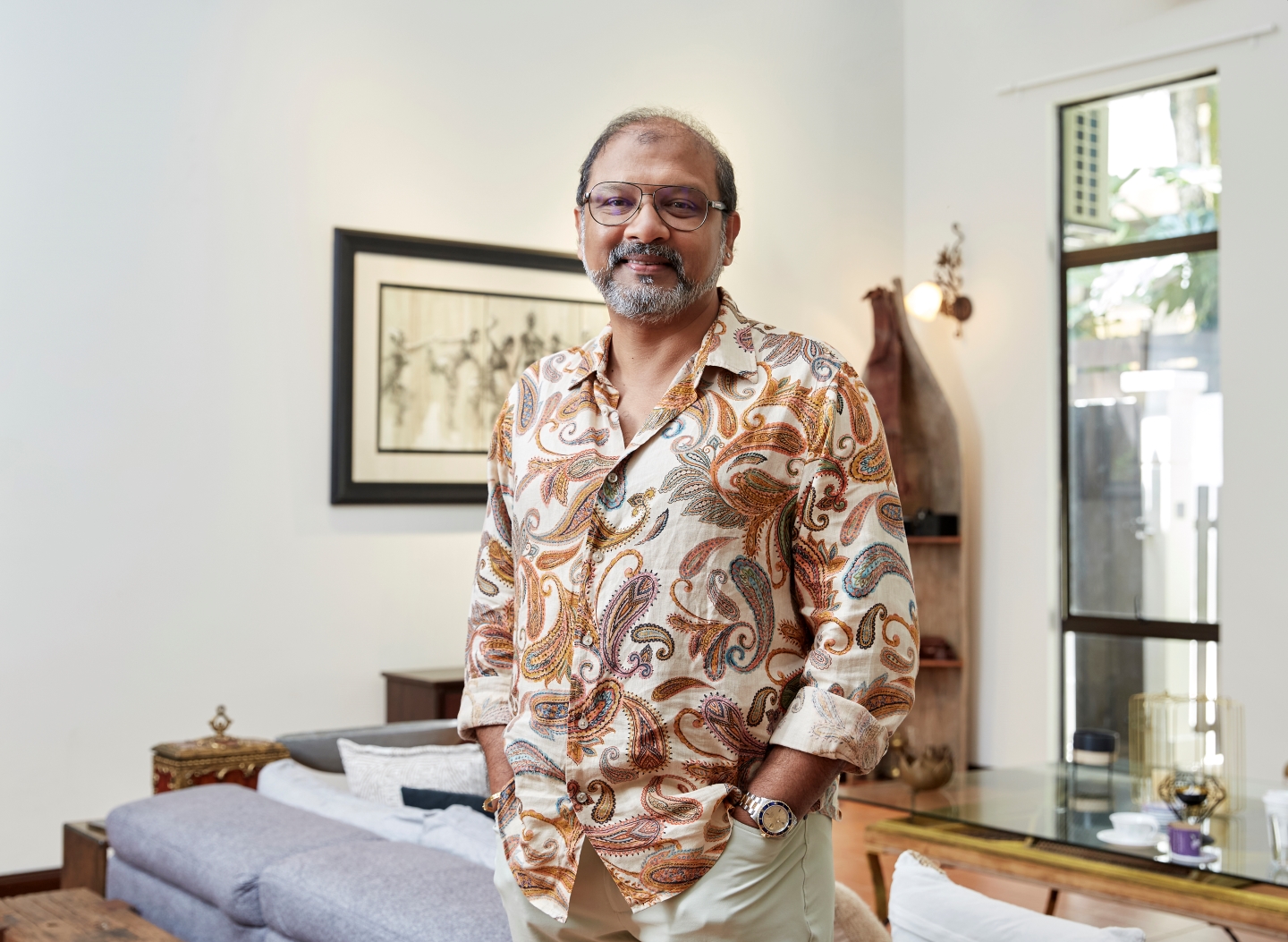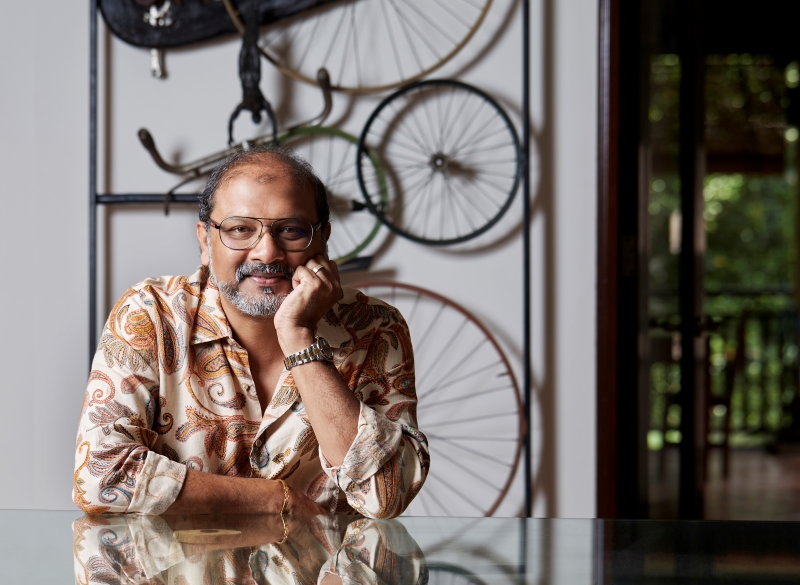
Prem: Addiction requires professional treatment, just like any other medical condition (Photo: Soo Phye)
"The thing with addiction is that you don’t know when it’s becoming a problem.” These words resonate with a chilling truth. Addiction creeps in unnoticed, often catching individuals off guard. “You don’t really realise you have a problem or are in dire need of help. It’s very rare that people willingly seek support to overcome their addictions,” says Prof Dr Prem Kumar Shanmugam, founder and CEO of Solace Asia, Malaysia’s premier private rehabilitation centre. This stark reality underscores the silent, pervasive nature of addiction and the immense challenge of recognising and seeking help.
Renowned for its expert clinicians and advanced treatment modalities, Solace Asia excels in mental health care, addiction recovery and relapse prevention. In a sit-down interview at his home in the south of Kuala Lumpur, Prem shares his harrowing journey of overcoming alcohol dependency and explores personal stories of struggle, resilience and ultimate triumph.
Back story
“I come from a decent middle-class family and my parents were teachers. As the oldest son in a typical Indian household, I faced high expectations. I was a good student and did well in school, but scoring 90% wasn’t enough — it had to be 100%,” says Prem, 53.
It never quite bothered him, but he discovered only much later, while lying on his “deathbed”, that addiction is a genetic predisposition, with 30% to 50% of cases being inherited. “In my family, it ran high. I only learned this later.”
Initially, he started having a drink or two for entertainment, enjoying time with friends, and was pleased that he could hold his drink. “Naturally, because I had a high tolerance for alcohol, I drank more so I could party longer while the rest of the gang collapsed. It felt good,” he recalls.
“Gradually, things began to shift when I was 16 or 17. Addiction problems, whether it is drugs or alcohol, often starts innocently at this age. The early college or pre-university years are critical because relationships, friends and community matter a lot. It is important for parents to know who their children’s friends are and what they are up to,” says the happily married father of two.
solace_facility-29.jpg

Life in shambles
Alcohol addiction began to take hold when Prem was in his early 20s. By then, all his friends had moved on, and he had to leave his house because his behaviour had become an embarrassment to the family, who saw his actions as highly irresponsible.
He delves deeper into the darker side of his problem and what hitting rock bottom looks like for an addict. “I ran away from home because I couldn’t control my drinking. My hands would tremble if I didn’t get my daily fix. After a while, the money ran out and I was doing odd jobs just to feed my addiction. I didn’t care if I went hungry. It was a vicious cycle. And because it is a disease of the brain, the rational part doesn’t make sense anymore.”
By the time Prem realised he had a problem, it was too late to stop. He had no friends, no relationships — his girlfriend had left him and he never finished university due to undiagnosed ADHD, which left him unable to focus. He also could not hold a job. “When I didn’t have anything, alcohol became my best friend. It was the fuel that would keep me going until I fell dead, I thought. I had accepted that fate.”
This, he says, illustrates how the problem overtakes the brain and is related to deficiencies in the brain’s reward system, which hijacks rational thought. This explains why even highly educated professionals are involved with drugs and alcohol and do the craziest things; their rational minds no longer function properly. For Prem, this began long before he finished school. He was very sick with cirrhosis of the liver and bleeding through his nose daily, “but when I drank, it stopped”.
He would leave home, hide for months as his family searched for him across the country, and eventually be found and brought back to recuperate at home. Once physically better, he would leave again, start drinking, fall into bad company and engage in irrational behaviour. This cycle of recovery and relapse was repeated several times in a rollercoaster of highs and lows, with hospital visits punctuating his downward spiral.
solace_retreat_in_patient_facilities_interior.jpg

Turning point
When he was 32, his sister took him to stay with her in Singapore because his liver was failing and doctors had given up hope. “One day, I left home to buy alcohol and experienced something called alcohol-induced amnesia, where my brain just shut down. For about three days, I was roaming the streets with no memory of anything.”
His sister and brother-in-law reported him missing, and the police picked him up from where he was sleeping — outside a stranger’s home. He regained consciousness in Changi General Hospital and was informed that he was dying from liver failure. “All I could think about was the drink I desperately needed and asked the doctor to discharge me. That’s how badly my brain had been hijacked — my priority was a peg, even as I lay on my deathbed.”
One doctor came and spoke to him, recommending a psychiatrist who specialised in treating addiction. “Why don’t you see him?” he suggested, and Prem’s mother finally persuaded him to go.
What the psychiatrist told him changed his life: “What you have is a disease. Addiction is an illness of the brain. Whatever you have done is not really your fault.”
For the first time, he realised he was not a bad person. “I asked him, ‘You mean I’m not an embarrassment to my family? I’m not a disgrace?’ He said the substance abuse caused it, and I could be treated.”
To begin treatment, the psychiatrist told Prem to rely on the doctor’s brain for the next three months because his own was sick. If it worked, his life would change, Prem was willing to give it a shot. “That’s when my life started to change. As my brain began to recover from alcohol, things started to make sense, and I developed an obsession with helping others. That’s what I wanted to do for the rest of my life.”
He returned to university, and his obsession with alcohol and drugs shifted to education. Determined to become the most qualified person in the field of addiction medicine, Prem immersed himself in studying, researching and publishing his work.
“Now, every Sept 4 since 2003, I celebrate both my birthday and my sobriety anniversary. It feels like God gave me a second chance. I sobered up and stopped drinking at 33. I have to fulfil this mission. People do recover and achieve amazing things. I want to spread that message. I know someone who left medicine to become a pastor to help others with addiction. He moved to South Africa and is doing great work there.”
Finding solace
In 2014, Prem founded Solace Asia, which has since become a leading rehabilitation centre dedicated to providing evidence-based comprehensive care for those in need. “Our team of internationally certified specialists understands the complex nature of addiction and its profound impact on individuals and their loved ones. They excel at running a centre focused on holistic treatment,” says the accredited clinical psychotherapist, counsellor and clinical supervisor with more than 10 years’ experience in addiction treatment and mental health administration.
The treatment approach, grounded in the pioneering work of addiction experts and the company’s unique Solace Flower model, integrates medical, psychiatric, physical and spiritual components to ensure a well-rounded recovery journey. It also includes a 360-degree assessment, 18 months of aftercare and family workshop.
“At Solace Asia, we believe addiction is not a life sentence. With the right care, understanding and support, recovery is possible. Our tailored programmes have helped countless individuals rebuild their lives, reforge connections and rediscover their purpose. So far, we have successfully treated more than 2,000 clients both locally and internationally.”
Prem has also established Solace Wellness and Solace Academy, forming the Solace trinity. The former provides professional counselling that is accessible and affordable; the latter was started in 2017 to train psychologists, university students and medical doctors on the basis of knowledge sharing. “It’s our way of giving back to the community in terms of knowledge dissemination while reinforcing the ideas and practices that accompany the unique treatment methodology we follow here.”
He also actively consults and leads projects with Malaysian and foreign ministries on addiction and mental health issues. He is a certified practitioner in the management of family violence counselling with Singapore’s Ministry of Community Development, Youth and Sports.
Prem’s work also extends beyond the country to the Maldives, the Middle East, Bangladesh and Singapore, and in between his local and overseas engagements, clinical duties and consulting work, he dedicates time to review and write articles for international conferences. His contributions include two handbooks for a UK-based university’s counselling course and treatment manuals for Solace’s addiction treatment programme.
_s1a9906_1a.jpg

Healing addiction
Besides alcohol addiction, drug use has changed and evolved over the years. “In my travels and at conferences around the world, I’ve seen different countries facing various issues. They now affect all socioeconomic groups, from lorry drivers and labourers to doctors and other professionals. The types of drugs being abused have also diversified.
“For example, methamphetamine was initially used by long-haul truck drivers to stay awake. Now, sex workers, students and even professionals take it to maintain alertness. Students pop it as a ‘study pill’ to stay awake for extended periods, which is incredibly damaging as it leads to brain exhaustion and long-term psychological effects.”
Different professions tend to abuse different substances. In the music industry, there is easy access to a menu of drugs. Doctors might abuse prescription opiates because they have access to them, while cocaine is often used by the wealthy because of its high cost and association with parties. Synthetic cannabis, ketamine and other substances are becoming more prevalent as well.
What advice would he give someone struggling with substance abuse?
“The first thing I would say is, ‘It’s okay, it’s not your fault’.” Addiction is a disease, not a moral failing. Many people do not realise that they are sick and need help. Families often struggle with how to handle a loved one’s addiction and relationships can suffer. “My dad and I didn’t speak during the period of my alcohol addiction. Now we’re best friends because he eventually understood that I was sick. Family support is crucial in recovery and, often, it’s the mothers and sisters who bring their loved ones in for treatment.
“If you suspect your loved one has substance abuse issues, you are probably right, but the first reaction is often denial. If you think there’s a problem, seek professional help immediately. You can love and care for your family member, but you cannot cure them on your own. Addiction requires professional treatment, just like any other medical condition.”
This article first appeared on May 20, 2024 in The Edge Malaysia.


